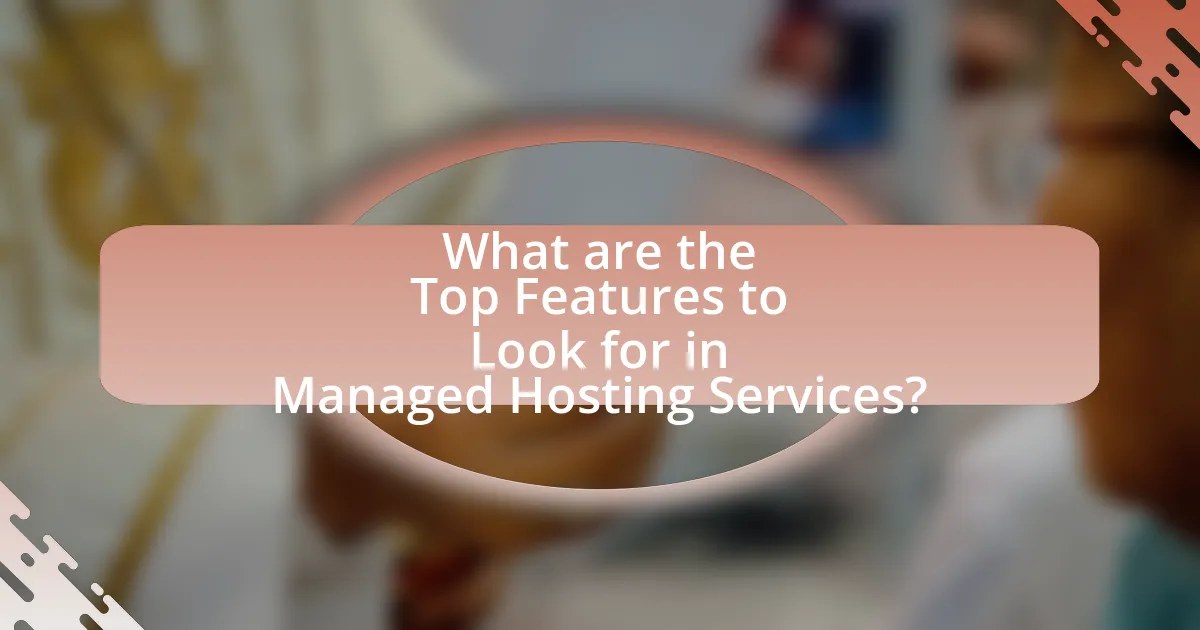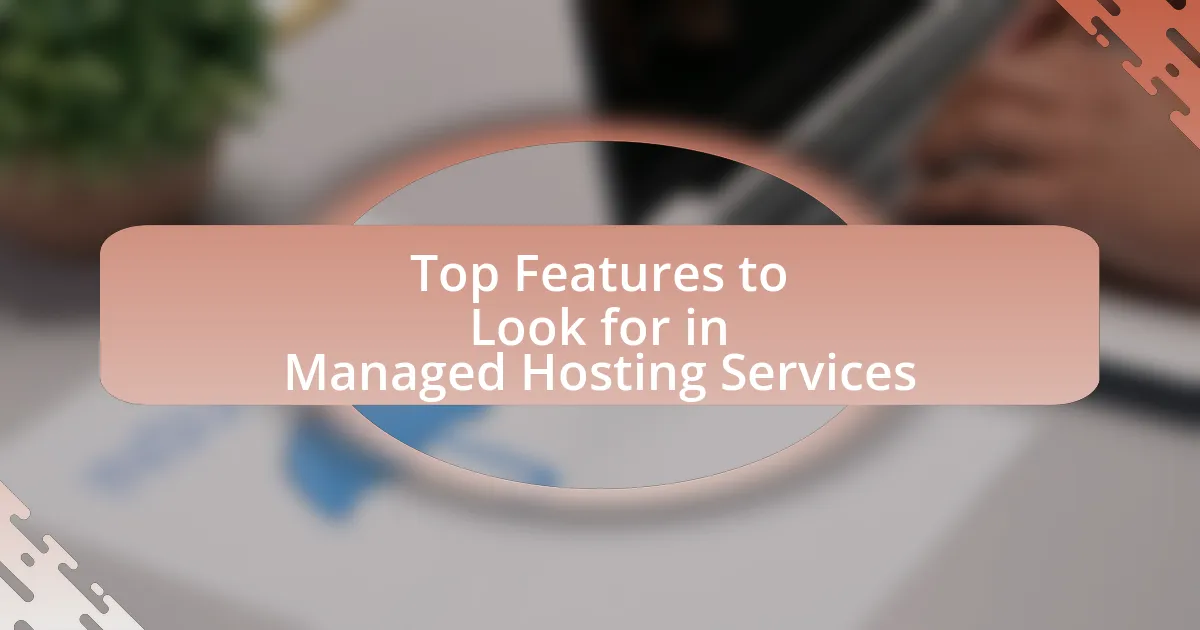Managed hosting services are essential for businesses seeking reliable and efficient online operations. Key features to consider include robust security measures, reliable uptime guarantees, comprehensive customer support, scalability options, and performance optimization tools. The article emphasizes the importance of selecting the right managed hosting service, as it directly affects website performance, security, and scalability. It also outlines critical factors influencing decision-making, such as reliability, performance metrics, and pricing structures, while distinguishing managed hosting from traditional hosting. Additionally, the article provides best practices for evaluating providers, common pitfalls to avoid, and strategies to maximize the managed hosting experience.

What are the Top Features to Look for in Managed Hosting Services?
The top features to look for in managed hosting services include robust security measures, reliable uptime guarantees, comprehensive customer support, scalability options, and performance optimization tools. Robust security measures, such as firewalls and DDoS protection, are essential to safeguard data. Reliable uptime guarantees, typically above 99.9%, ensure that websites remain accessible. Comprehensive customer support, available 24/7, is crucial for resolving issues promptly. Scalability options allow businesses to adjust resources as needed, accommodating growth. Performance optimization tools, including caching and content delivery networks, enhance website speed and efficiency. These features collectively ensure a secure, reliable, and efficient hosting environment.
Why is it important to choose the right managed hosting service?
Choosing the right managed hosting service is crucial because it directly impacts website performance, security, and scalability. A suitable managed hosting provider ensures optimal server management, which enhances uptime and speed, leading to better user experiences and improved search engine rankings. For instance, a study by Google found that a one-second delay in page load time can lead to a 20% decrease in conversions. Additionally, the right service offers robust security measures, protecting sensitive data from breaches, which is vital given that cybercrime is projected to cost the world $10.5 trillion annually by 2025. Therefore, selecting an appropriate managed hosting service is essential for maintaining a reliable and secure online presence.
What factors should influence your decision-making process?
The factors that should influence your decision-making process in selecting managed hosting services include reliability, performance, security, support, and scalability. Reliability ensures that your website remains accessible, with uptime guarantees typically above 99.9%. Performance is critical, as faster load times can improve user experience and SEO rankings; studies show that a one-second delay can reduce conversions by 7%. Security features, such as SSL certificates and regular backups, protect your data and maintain customer trust. Support availability, including 24/7 assistance, is essential for resolving issues promptly, as downtime can lead to significant revenue loss. Lastly, scalability allows your hosting solution to grow with your business, accommodating increased traffic without compromising performance.
How do managed hosting services differ from traditional hosting?
Managed hosting services differ from traditional hosting primarily in the level of support and management provided. In managed hosting, the service provider takes care of server management, maintenance, security, and updates, allowing businesses to focus on their core operations. In contrast, traditional hosting typically requires users to manage their own servers, including software updates and security measures, which can lead to increased complexity and potential vulnerabilities. This distinction is crucial as it impacts operational efficiency and resource allocation for businesses.
What key features should you prioritize in managed hosting services?
Key features to prioritize in managed hosting services include robust security, reliable uptime, scalable resources, and expert support. Security is critical, as managed hosting should offer features like firewalls, DDoS protection, and regular backups to safeguard data. Reliable uptime is essential, with providers typically guaranteeing 99.9% uptime to ensure website accessibility. Scalable resources allow businesses to adjust their hosting plans based on traffic demands, which is vital for growth. Lastly, expert support should be available 24/7, providing assistance for technical issues and ensuring smooth operations. These features collectively enhance performance and reliability, making them essential for effective managed hosting services.
How does scalability impact your hosting needs?
Scalability directly influences hosting needs by determining the ability to adjust resources based on traffic demands. As a business grows, its website may experience increased visitor traffic, requiring more bandwidth, storage, and processing power. For instance, a study by Gartner indicates that 70% of businesses experience traffic spikes during peak seasons, necessitating scalable hosting solutions to maintain performance and uptime. Therefore, choosing a hosting service that offers scalable options ensures that businesses can efficiently manage growth without compromising user experience or incurring excessive costs.
What role does security play in managed hosting services?
Security is a fundamental component of managed hosting services, ensuring the protection of data, applications, and infrastructure from unauthorized access and cyber threats. Managed hosting providers implement various security measures, such as firewalls, intrusion detection systems, and regular security audits, to safeguard client information. According to a report by Cybersecurity Ventures, global cybercrime costs are projected to reach $10.5 trillion annually by 2025, highlighting the critical need for robust security in hosting environments. This emphasis on security not only protects sensitive data but also enhances compliance with regulations such as GDPR and HIPAA, which mandate stringent data protection standards.
Why is customer support crucial for managed hosting?
Customer support is crucial for managed hosting because it ensures timely resolution of technical issues, which directly impacts website performance and uptime. Managed hosting services often involve complex infrastructure that requires expert assistance; therefore, having responsive customer support can minimize downtime and enhance user experience. According to a study by Zendesk, 82% of customers have stopped doing business with a company due to poor customer service, highlighting the importance of effective support in retaining clients and maintaining service reliability.
How do performance and uptime affect managed hosting services?
Performance and uptime are critical factors that directly influence the effectiveness of managed hosting services. High performance ensures that websites and applications load quickly and operate smoothly, which enhances user experience and can lead to increased customer satisfaction and retention. Uptime, measured as the percentage of time a service is operational, is essential because even minor downtimes can result in significant revenue loss and damage to brand reputation. For instance, a study by Gartner indicates that downtime can cost businesses an average of $5,600 per minute, underscoring the financial implications of inadequate uptime. Therefore, managed hosting services must prioritize both performance and uptime to deliver reliable and efficient solutions for their clients.
What benchmarks should you consider for performance metrics?
Key benchmarks to consider for performance metrics in managed hosting services include uptime percentage, response time, load time, and resource utilization. Uptime percentage measures the reliability of the service, with a benchmark of 99.9% being standard in the industry, indicating minimal downtime. Response time assesses how quickly the server responds to requests, ideally under 200 milliseconds for optimal user experience. Load time, which should be under three seconds, affects user retention and SEO rankings. Resource utilization metrics, such as CPU and memory usage, help ensure that the hosting environment can handle traffic spikes efficiently. These benchmarks are critical for evaluating the overall performance and reliability of managed hosting services.
How can uptime guarantees influence your choice of provider?
Uptime guarantees significantly influence the choice of a hosting provider by assuring customers of the reliability and availability of their services. A provider that offers a high uptime guarantee, typically 99.9% or higher, indicates a commitment to minimizing downtime, which is crucial for businesses that rely on their online presence. For instance, a study by Gartner shows that even a minute of downtime can cost businesses thousands of dollars, emphasizing the importance of selecting a provider with strong uptime commitments. Therefore, evaluating uptime guarantees helps customers assess the potential impact on their operations and revenue, guiding them toward providers that align with their reliability needs.

What additional considerations should you keep in mind?
When selecting managed hosting services, consider scalability, security, and support. Scalability ensures that your hosting can grow with your business needs, allowing for increased traffic and resource demands without significant downtime. Security is critical, as managed hosting should include robust measures such as firewalls, DDoS protection, and regular backups to safeguard your data. Support is essential; look for 24/7 customer service and technical assistance to resolve issues promptly. These considerations are validated by industry standards, which emphasize the importance of these features in maintaining optimal performance and reliability in managed hosting environments.
How does pricing structure affect your selection of managed hosting services?
Pricing structure significantly influences the selection of managed hosting services by determining affordability, scalability, and the range of features offered. A clear pricing model allows businesses to assess their budget against the services provided, ensuring they choose a plan that meets their needs without overspending. For instance, tiered pricing models enable users to select plans based on their specific requirements, such as bandwidth and storage, which can lead to cost savings. Additionally, transparent pricing helps avoid hidden fees, fostering trust in the service provider. According to a survey by HostingAdvice, 70% of users prioritize clear pricing when selecting hosting services, indicating its critical role in decision-making.
What are the common pricing models for managed hosting?
Common pricing models for managed hosting include flat-rate pricing, pay-as-you-go pricing, tiered pricing, and custom pricing. Flat-rate pricing offers a fixed monthly fee for a set of services, making budgeting straightforward. Pay-as-you-go pricing charges based on actual resource usage, providing flexibility for variable workloads. Tiered pricing structures services into different levels, allowing customers to choose based on their needs and budget. Custom pricing is tailored to specific requirements, often negotiated between the provider and the client. These models cater to diverse business needs, ensuring that companies can find a suitable option based on their operational demands and financial constraints.
How can you assess the value of features against costs?
To assess the value of features against costs in managed hosting services, conduct a cost-benefit analysis that compares the specific features offered with their associated costs. This involves identifying key features such as uptime guarantees, customer support, scalability, and security measures, and then evaluating how each feature contributes to overall business objectives and operational efficiency. For instance, a feature like 24/7 customer support may have a higher cost but can significantly reduce downtime and improve user satisfaction, justifying the expense. Additionally, industry benchmarks and customer reviews can provide insights into the effectiveness and reliability of features relative to their costs, ensuring informed decision-making.
What are the benefits of using a managed hosting service?
Using a managed hosting service provides enhanced performance, security, and support for websites. Managed hosting services optimize server configurations, ensuring faster load times and improved uptime, which can lead to better user experiences and higher search engine rankings. Additionally, these services include robust security measures, such as regular updates and monitoring, which protect against cyber threats. Furthermore, managed hosting offers expert technical support, allowing businesses to focus on their core operations without worrying about server management. According to a study by HostingAdvice, 70% of businesses reported improved performance and reduced downtime after switching to managed hosting solutions.
How can managed hosting services enhance your website’s performance?
Managed hosting services enhance your website’s performance by providing optimized server configurations, dedicated resources, and expert support. These services ensure that websites operate on high-performance hardware, which reduces load times and improves user experience. For instance, managed hosting typically includes features like automatic updates, security patches, and performance monitoring, which collectively minimize downtime and enhance reliability. According to a study by Google, a one-second delay in page load time can lead to a 20% decrease in conversions, highlighting the critical role of performance in user engagement.
What advantages do managed hosting services offer for businesses?
Managed hosting services offer businesses enhanced performance, security, and support. These services provide dedicated resources, ensuring optimal website speed and reliability, which is crucial for user experience and retention. Additionally, managed hosting includes robust security measures such as firewalls, DDoS protection, and regular backups, significantly reducing the risk of data breaches. Furthermore, businesses benefit from expert technical support, allowing them to focus on core operations while leaving server management to professionals. This combination of performance, security, and support leads to increased operational efficiency and reduced downtime, ultimately contributing to business growth.

What are the best practices for choosing a managed hosting service?
The best practices for choosing a managed hosting service include evaluating performance, support, security, scalability, and pricing. Performance is critical; select a provider that guarantees high uptime and fast load times, as these factors directly impact user experience and SEO rankings. Support is essential; opt for a service that offers 24/7 customer support through multiple channels, ensuring assistance is available whenever needed. Security features, such as SSL certificates, firewalls, and regular backups, are vital to protect data and maintain compliance with regulations. Scalability is important; choose a provider that allows easy upgrades to accommodate growth without significant downtime or migration issues. Finally, analyze pricing structures to ensure they align with your budget while providing the necessary features and support. According to a 2021 survey by HostingAdvice, 70% of businesses reported that uptime and support were the most critical factors in their hosting decisions, reinforcing the importance of these best practices.
How can you evaluate potential managed hosting providers?
To evaluate potential managed hosting providers, assess their service offerings, performance metrics, customer support, and security features. Start by reviewing the range of services they provide, such as scalability, backup solutions, and managed services. Performance metrics, including uptime guarantees and server response times, are critical; for instance, a provider should offer at least 99.9% uptime. Customer support should be available 24/7 through multiple channels, ensuring timely assistance. Lastly, examine their security protocols, including data encryption and compliance with industry standards, to ensure your data is protected.
What questions should you ask during the selection process?
During the selection process for managed hosting services, you should ask questions that clarify the provider’s capabilities and support. Key questions include: “What level of technical support is available 24/7?” This question ensures you understand the responsiveness and expertise of the support team, which is critical for minimizing downtime. Additionally, inquire, “What security measures are in place to protect my data?” This question addresses the provider’s commitment to data protection, which is essential given the increasing frequency of cyber threats. Furthermore, ask, “How scalable are your hosting solutions?” This question helps determine if the provider can accommodate future growth without significant disruptions. Lastly, “What is your uptime guarantee?” This question is vital as it directly impacts the reliability of your services, with industry standards typically around 99.9% uptime. These questions collectively ensure that you select a managed hosting service that meets your operational needs effectively.
How can reviews and testimonials guide your decision?
Reviews and testimonials can significantly guide your decision by providing insights into the experiences of previous customers with managed hosting services. These evaluations often highlight the strengths and weaknesses of a service, allowing potential users to assess reliability, customer support, and performance. For instance, a study by BrightLocal found that 91% of consumers read online reviews, and 84% trust them as much as personal recommendations, indicating their influence on purchasing decisions. By analyzing both positive and negative feedback, you can make a more informed choice that aligns with your specific needs and expectations in managed hosting services.
What common pitfalls should you avoid when selecting managed hosting services?
When selecting managed hosting services, avoid the common pitfalls of inadequate research, overlooking scalability, and ignoring customer support quality. Inadequate research can lead to choosing a provider that does not meet specific business needs, as many companies fail to assess their requirements thoroughly. Overlooking scalability is critical; a provider that cannot accommodate growth may hinder future expansion, which is essential for businesses aiming to scale. Ignoring customer support quality can result in prolonged downtime and unresolved issues, as reliable support is crucial for maintaining service continuity. These pitfalls can significantly impact the effectiveness and reliability of managed hosting services.
How can you identify red flags in managed hosting offers?
To identify red flags in managed hosting offers, examine the transparency of the service provider regarding their infrastructure, support, and pricing. A lack of clear information about server locations, uptime guarantees, and support availability often indicates potential issues. Additionally, if the pricing structure is vague or includes hidden fees, it suggests that the provider may not be trustworthy. According to a 2021 survey by HostingAdvice, 70% of users reported dissatisfaction with providers that did not clearly outline their service terms, highlighting the importance of clarity in managed hosting offers.
What misconceptions about managed hosting should you be aware of?
One misconception about managed hosting is that it is only suitable for large enterprises, while in reality, it can benefit businesses of all sizes. Managed hosting services provide tailored solutions that can scale according to the specific needs of small to medium-sized businesses, offering them the same level of support and resources that larger companies enjoy. Additionally, many believe that managed hosting is prohibitively expensive; however, the cost can be justified by the reduction in IT overhead and the increased uptime and performance that these services typically deliver. According to a study by HostingAdvice, businesses utilizing managed hosting can experience up to 99.9% uptime, which significantly enhances operational efficiency and customer satisfaction.
What tips can help you maximize your managed hosting experience?
To maximize your managed hosting experience, prioritize clear communication with your hosting provider. Establishing a direct line of communication ensures that you can quickly address any technical issues or service inquiries, which is crucial for maintaining website performance. Additionally, regularly review your hosting plan to ensure it aligns with your current needs, as many providers offer scalable solutions that can adapt to your growing requirements. Utilizing performance monitoring tools can also help you track uptime and response times, allowing you to make informed decisions about your hosting environment. According to a study by HostingAdvice, 99.9% uptime is a standard expectation for managed hosting services, emphasizing the importance of reliable performance.
How can regular maintenance improve your managed hosting service?
Regular maintenance enhances managed hosting services by ensuring optimal performance, security, and reliability. Consistent updates and monitoring prevent potential issues, such as server downtime or security breaches, which can disrupt service. For instance, a study by the Ponemon Institute found that the average cost of a data breach is $3.86 million, highlighting the financial impact of inadequate maintenance. Additionally, regular maintenance can improve load times and user experience, as servers are kept up-to-date with the latest technologies and configurations. This proactive approach not only safeguards data but also boosts customer satisfaction and retention.
What strategies can enhance your website’s security on managed hosting?
Implementing strong security measures is essential for enhancing your website’s security on managed hosting. Key strategies include utilizing a Web Application Firewall (WAF) to filter and monitor HTTP traffic, which can block malicious requests and prevent attacks such as SQL injection and cross-site scripting. Regular software updates and patch management are crucial, as they address vulnerabilities in the hosting environment and application software, reducing the risk of exploitation. Additionally, employing SSL certificates ensures encrypted data transmission, safeguarding sensitive information from interception.
Furthermore, implementing strong password policies and two-factor authentication (2FA) adds an extra layer of security by requiring users to provide additional verification, thus minimizing unauthorized access. Regular security audits and vulnerability assessments help identify and mitigate potential threats proactively. According to a report by Cybersecurity Ventures, global cybercrime damages are projected to reach $10.5 trillion annually by 2025, highlighting the importance of robust security strategies in managed hosting environments.


